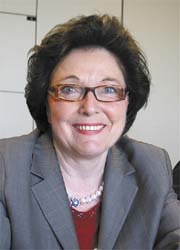Wound management in practice
A question of authority between doctor and nurse
Marie-Luise Müller is President of Deutscher Pflegerat e.V. (German Care e.V) Council, and Chair of its Congress, which was held alongside the Capital Congress on Medicine and Health 2008 in Berlin this June. During our interview, we asked her whether there is too little German medical and political recognition of nursing as a health profession in its own right.

In agreement, Marie-Luise Müller pointed out that this is mainly to do with the social insurance system and the basic understanding among the medical fraternity. ‘The Social Welfare Code volume V does not recognise care services, which means care is always listed as a sub-item under medical services. It’s a long-standing problem from which the structures of our medical fraternity have evolved and they are completely set. This goes hand in hand with the general German mentality, which is always initially very skeptical about change of any kind. German doctors fear a de-professionalisation of their rank, so they cling to their personal position of power.’
Whilst the doctor’s role and image has been established for over 150 years, the nursing profession is only now questioning it, she added, and this very much involves the transfer of responsibilities, particularly for wound care. A surgeons guideline stipulates that they must apply the first wound dressing after surgery, as well as the last i.e. before hospital discharge. ‘However, this only refers to wounds caused by surgeons, where they know the exact anastomosis or the surgical thread used, and where they can assess whether any endogenous infection is present. In this case, it is understandable that the doctor wants to take personal responsibility. We do not dispute this. Our main concern is in the broad spectrum of chronic wounds, such as diabetic foot etc. These are all widespread diseases where we need to observe the patient as a whole. Specialist doctors are only concerned with their field of specialisation. Moreover, wound care requires certain capacities and resources. Sometimes there are 10 nurses to every doctor. That’s why I believe it is right that in certain areas there should not only be a division of labour but also an actual transfer of tasks and responsibility.’
Asked about the opportunities for nurses that result from the new Law on Further Developments in Care, under which they can practice certain aspects of medicine under certain conditions, she believes this has paved the way for academic concepts. ‘I can foresee there will be nurse practitioners with an MBA qualification in Germany no later than 2012. In 2009 the first German universities will start running the respective degree courses in nursing care. In the Netherlands and in all Anglo-Saxon countries this academic qualification is already available. In the USA there are already 106,000 nurse practitioners, working under various conditions of employment, and some are self-employed. For chronic wounds, they take over the complete anamnesis and investigation. They are informed about current wound care studies, carry out therapy or delegate it to a nurse, something that the doctor used to do. They also use IT. They document wounds with photographs and send these to specialists, consult with them and then return to the patients. I believe nurse practitioners are the drivers here, because they work right where it is happening, with broad access to patients. They can help them, for instance, to change their diet, or discuss questions about hygiene or sexuality. Usually there is not the same scope for this when patients talk to doctors. A nurse practitioner would have far more training in leading such conversations. So, I believe we should approach patients not only clinically but in consideration of their general environment, circumstances and health.’
How would wound care specialists be integrated into the daily life in hospital? ‘Many hospitals already use good wound experts. Large hospitals in particular tend to have specialist wound care departments, where in- and out-patients can be treated. There is already good dialogue between specialists and wound experts in those departments. Out-patient care is a little more involved; for this nurses have taken many training courses so are often better informed than doctors. The problem in hospitals revolves around the transfer of responsibility. The transfer management writes a comprehensive wound care report for the patient’s general practitioner (GP). This is often ignored by many GPs because they lack knowledge. Obviously it makes sense to do something about that. The public is increasingly aware that we live in an ageing society as well as a society which calls for more autonomy and personal responsibility when it comes to health. This is why people are entitled to have their wound dressings changed by somebody who is highly specialised and qualified to do it.’
01.07.2008





